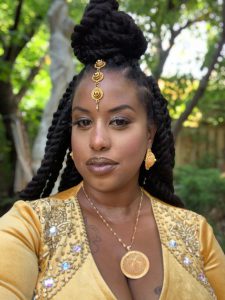It’s been nearly a month since the Polaris Music Prize short list reveal, which named DNA Activation by Witch Prophet’s (née Ayo Leilani) in its Top Ten, but Prophet is still in disbelief. “That was a complete shock to my system,” she explains. “I’m slowly getting used to it. It was really, really exciting.”
 As a co-founder of hip-hop artistic collective 88 Days of Fortune, and member of hip-hop group Above Top Secret, one assumes Prophet is too cool to be giddy. But for years she wondered if she’d release solo music. The collective – one of many voices – was where she felt comfortable. Until it wasn’t.
As a co-founder of hip-hop artistic collective 88 Days of Fortune, and member of hip-hop group Above Top Secret, one assumes Prophet is too cool to be giddy. But for years she wondered if she’d release solo music. The collective – one of many voices – was where she felt comfortable. Until it wasn’t.
“I spent years, before the The Golden Octave [her 2018 debut], trying to figure out my sound and overcome stage fright, internal insecurities and different things,” says Prophet. “My focus was on helping other people so I wouldn’t have to focus on myself. It’s easier to help other people than to deal with your own issues. At first it was wonderful, but then it became a crutch to my own growth, [not] recognizing that, ‘Hey, I’m an artist who also wants to create.’”
After a decade of underground influence that went beyond Canada, 88 Days of Fortune dispersed. People moved on. Some abandoned music, others made it a part-time thing. And friendships ended. It was a loss, but also an opportunity to step out on her own. Prophet says she couldn’t have done it without DJ/producer, Sun Sun, her wife, co-creator, and the quiet force behind The Golden Octave, who helped her take the album one song at a time.
“It’s such a simple piece of advice, but I wasn’t thinking like that,” she says. “I was thinking too grandiose. I was hyping myself up to be stressed. But there was no need to be stressed.”
The widely-praised debut sounded ahead of its time, though most tracks were written a decade prior. Prophet’s voice was front and center. She was now ready to begin DNA Activation — originally intended as her debut. Inspired by her family tree, including her teenage son (to whom she gave birth when she was 18), Prophet calls it “an intimidating process.”
“What we’re trying to do is to really make our actions match our words”
“I don’t really share stuff about my family,” she explains. “And culturally, Ethiopian-Eritrean, it’s taboo. That’s private.”
The moving album birthed love songs like “Darshan,” about her son. And, tear-jerkers like “Ghideon” about her estranged father. “Sun was playing the beat. I got on the mic. She hit record and I just freestyled. And at the end she pressed stop and her eyes were so full of tears,” says Prophet, becoming emotional as she recalls the experience.
Now, with two celebrated albums, and a history of underground influence, Prophet and Sun Sun are creating indie label Heart Lake Records (inspired by the road on which their 50-acre farmland home sits). They’ve had the dream for years and they’re determined to make it a reality.
“We’re grown adults. We have a space. And now we’re trying to get some real funding and real money,” she says. “With 88 Days, we only ever got one grant and that was for $3,000, for our one-year anniversary, and then I won a pitch contest from ArtReach. For a lot of grants, you have to be an incorporated business, or a non-profit. The point is to make profits and allow people to make a living. We’re not a charity. This is business. I’m like, ‘Hey, give us money to actually help people.’ I’m surprised – we’re almost at $7, 000. That’s the most we’ve ever made. Ever! It’s like, Wow! People care and want to see this happen.
“There’s many conversations about the Canadian music industry not actually funding the most popular genre in the entire world, and most influential: hip-hop and R&B,” says Prophet. “It’s important not only for the Canadian music industry, but Canada to recognize the influence of BIPOC [Black, Indigenous, People of Colour] artists. It’s important to do it now because the time is now. The time has always been now, and it will always be now. Black Lives Matter is more than just the posts. Actions speak louder than words, so what we’re trying to do is to really make our actions match our words.
“Heart Lake records will do [that], and the first person to go somewhere with Heart Lake is Witch Prophet,” she says with a laugh. “We’re independent. We’re a queer-woman-led label. We’re Black-owned, and we can do this. The ability to amplify voices is something people take for granted. We don’t take that for granted — we’ve never taken that for granted.”